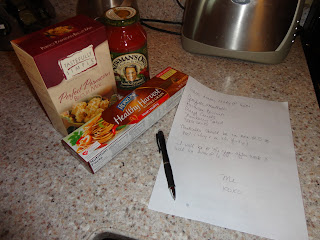Wednesday, November 30, 2011
Putting Dinner on the Table - It's a Family Affair
When I was in high school I had a friend who needed to go home after school and get dinner started for the family. Quite frankly, as a 15 year old kid I was quite aghast that her mother would put that kind of responsibility on her teenage daughter. Now as a working mother of older children I totally get where she was coming from.
I think most people would agree that family dinners are important. Whatever your family looks like, sitting down together at the end of the day to eat is a nice way to reconnect and relax a little bit. The problem is how do you actually get dinner on the table without it being stressful and anything but relaxing? One of my solutions is to make getting dinner on the table a family affair.
My experience has been that if I set forth the expectation that I need help getting dinner on the table I'll get the help. I've found that relying on my husband and kids has helped us to be more successful with our family dinners. Here are some tips that I use.
1. Communicate the plan to the family. My husband generally does a pretty good job of reading my mind with the exception of meal planning. I've found that writing down exactly what I expect him and the kids to make (including sides and bread) eliminates any second guessing.
2. Do what you can ahead of time. This evening's meal was spaghetti and meatballs. I threw the meatballs together before I left for work this morning (time for some freezer cooking!) and pulled the main ingredients out of the pantry. All that was left for my husband to do was boil the noodles, bake the meatballs and make the salad.
3. Set a timeline. Getting a complete meal on the table at the same time takes some experience. I like to set a specific time for dinner to be on the table and then let them know when key pieces of the dinner need to be made. This evening I planned on eating at 6pm which meant the meatballs needed to be on by 5:20. Unfortunately I forgot to write instructions about the biscuits so those weren't done until we were halfway through eating.
4. Be a little flexible. I gave instructions that we were to have glazed carrots with our meal. When I got home I found corn on the table instead. My husband prefers corn and since he made dinner he chose the vegetable. While I was looking forward to the carrots it was a small price to pay for not having to cook the dinner.
5. Be appreciative - even when the meal doesn't turn out as expected. Back when my husband first started helping with dinner we had some disasters. Just for the record, dill weed is not a good substitute for Italian seasoning. However, I've tried to never get upset or be demeaning about these less than desirable meals. I've always tried to show my appreciation for the effort he and the kids put forth.
That's what works for our family, what tips do you have to help get dinner on the table?
Subscribe to:
Post Comments (Atom)


My kids are a bit younger than yours at 14 and 9, but my biggest thing is this: whenever a child wanders into the kitchen when I am cooking and asks to help, I find something for them to do. Sometimes it seems like it would be easier for me to just finish it myself, but I want to encourage all helping, so I find a way to make it work! My daughter (the 14 year old) was making dinner once a week for a while, but we have gotten out of that habit--we will need to start up again as soon as the school play is over next week!
ReplyDeleteOver the years I've also struggled with the "it's easier to do it myself" but like you have found that won't work if we want some help! That's great having her make dinner by herself. My 15 year old made her favorite casserole a few weeks ago. It wasn't quite as good as I made it (she left out a few things) but was pretty proud of herself.
ReplyDelete
ReplyDeletemy webpage - http://lottery-how-to-win.com/